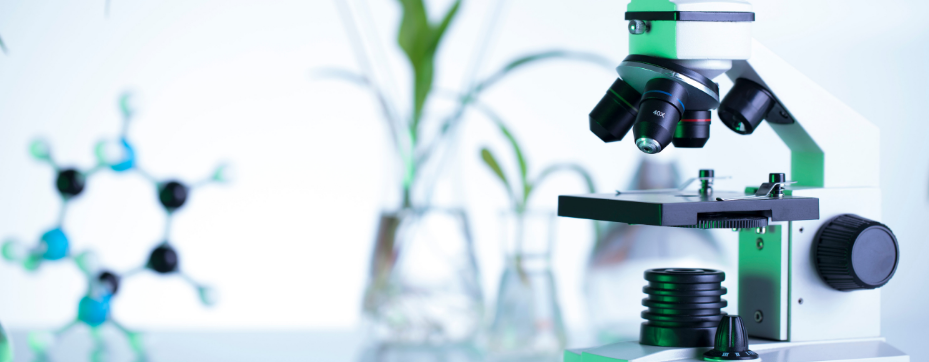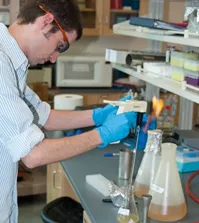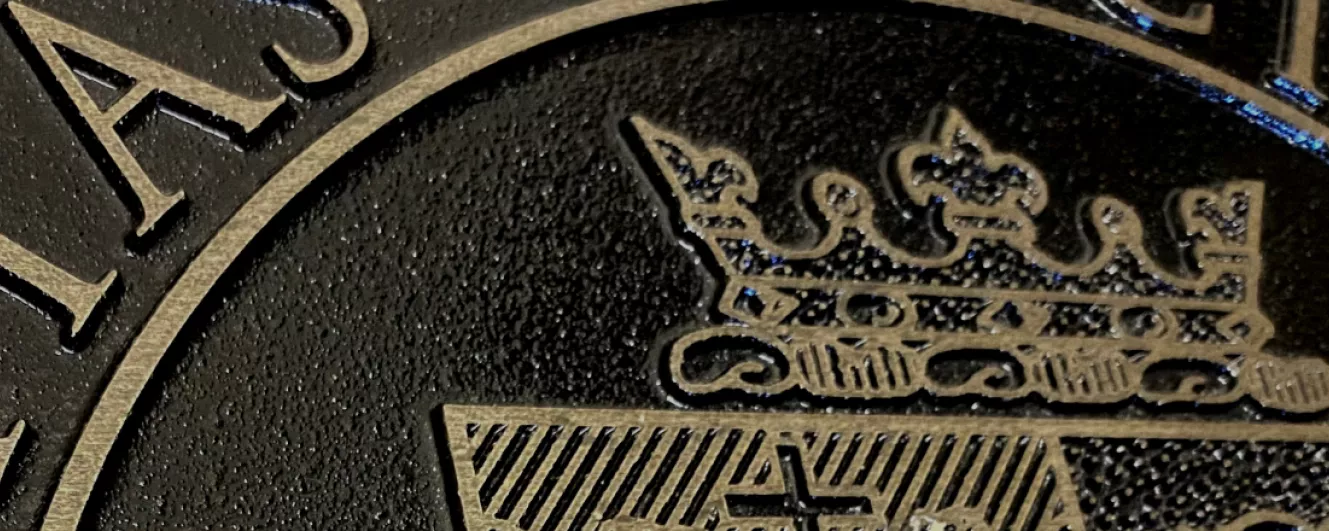
SCHOOL OF STEAM
Biochemistry, Bachelor of Science
Introduction
Earn a Respected Biochemistry Degree from Saint Francis University
The Biochemistry major is an interdisciplinary program offered jointly by the Dr. Wayne and Elizabeth Takacs Biology Department and the Chemistry Department. Biochemists study the chemical processes that occur in living cells as well as the structure and function of proteins, lipids, carbohydrates and nucleic acids.
Offered: On-Campus
access to state-of-the-art facilities and instrumentation
study science from the point of view of a biologist AND a chemist
conduct research starting as early as your freshman year

The SFU LEARNING EXPERIENCE
Biochemisty the Saint Francis Way
Biochemistry at Saint Francis University is an interdisciplinary program taught by both Biology and Chemistry faculty. This gives you the unique opportunity to study Biochemistry from a Biologist’s point of view and from a Chemist’s point of view! You can also tailor Biochemistry electives to your interests. Biochemistry electives can focus on Biology courses, Chemistry courses, or a mixture of the two
Find your career path in Biochemistry!
Biochemists work in pharmacology, bioinformatics, cancer biology, biophysics, immunology, and genetics. Your interests will determine your path to becoming a research chemist, pharmacist, high school teacher, forensic scientist, or an array of professions—it’s all up to you.
Research: Our students conduct research starting as early as their freshman year. You will have the option of continuing an existing research project in Biochemistry or start your own project with the help of faculty in the Dr. Wayne and Elizabeth Takacs Biology Department or the Chemistry Department.
Chemistry Club: The American Chemical Society Student Chapter is an organization dedicated to showing the university and the general community how fun science can be. We host and participate in a wide variety of campus events, including National Chemistry Week and the Solar 5K. We also partner closely with ROCK (Rural Outreach Chemistry for Kids) to offer our members many community service opportunities throughout the school year.
Biology Club: The Biology club has been designed to enhance the education and biology interests of students on campus. Activities and trips allow students to explore the world in a fun and educational way. Speakers are frequently invited in to allow students to gain perspective and greater understanding of many topics related to biology. This club is designed to help students prepare for their future in the sciences as well as to offer opportunities to participate in fellowship and networking activities.
Honors Societies: As a Biochemist, you can join both the TriBeta Biological Honor Society and the Gamma Sigma Epsilon Chemistry Honor Society.
- TriBeta Biological Honor Society: Saint Francis is home to the Upsilon Beta Chapter of Beta Beta Beta, the National Biological Honor Society. Our chapter was established in 1980 with twenty active student members and five faculty. Since that time, the Upsilon Beta chapter has inducted 199 regular, 33 associate, and 5 faculty members. Numerous student members have have received research scholarship grants from the TriBeta national office, and presented their research at the District Convention. Students who place in the poster or oral presentations receive a scholarship to attend the national meeting. Saint Francis University hosted the NE3 district convention for the first time in 2007.
- Gamma Sigma Epsilon Chemistry Honor Society: Gamma Sigma Epsilon is a national chemistry honor society founded in 1919 at Davidson College. The fraternity was created to promote academic excellence and undergraduate research scholarship in chemistry. An invitation to membership in Gamma Sigma Epsilon is a coveted honor among students in chemistry.
Outreach: R.O.C.K. (Rural Outreach Chemistry for Kids). In the R.O.C.K. program you can work with local K-12 students to show that science (especially chemistry) is important in everyone's life and can be exciting. R.O.C.K. volunteers perform hands-on chemistry experiments and activities using mainly household products. We focus on classroom visits (not stage presentations) in the 5 county area around SFU (Bedford, Blair, Cambria, Clearfield, and Somerset). R.O.C.K. also looks at the role that chemistry will have in the future as well as how it will benefit our society. Our chemistry students participate in a minimum of six R.O.C.K. events each academic year.
The best way to explore what the student experience really looks like is to schedule a visit!
CURRICULUM & COURSES
What You’ll Learn in the Undergraduate Biochemistry Program
Biochemists study the chemical processes that occur in living cells as well as the structure and function of proteins, lipids, carbohydrates, and nucleic acids. Biochemistry gives students a solid background in the fundamental principles of chemistry and biology. Students learn cutting-edge science and how to apply their knowledge to solve problems through critical thinking. Students will graduate ready to enter the workforce directly into research or to pursue further study in graduate or medical school. Students can also earn an American Chemical Society (ACS) certified degree. Undergraduate research, internships, or shadowing a medical professional are greatly encouraged.
On-Campus:
| Degree Path | Description | Course Catalog | Plan of Study |
|---|---|---|---|
Biochemistry, B. S. | in-person bachelor of science degree | ||
Biochemistry, B.A. | in-person bachelor of arts degree | Course Catalog - 25/26 | Plan of Study |
Pre-Medicine Concentration - Biochemistry, B. S. | Biochemistry, B.S., preparation for medical school | Course Catalog - 25/26 | |
Bio-Chemical Sciences, A.S. | designed to provide the foundational coursework for students preparing to move on to Duquense pharmacy school | Course Catalog - 25/26 | |
Bio-Chemical Sciences, A.S. | designed to provide the foundational coursework for students preparing to move on to LECOM pharmacy school |
Upon successful completion of the program, you will be able to:
- explain how cells and organisms sense and control their internal environment and respond to change, and how molecular structure dictates function
- use and read chemical formulas, nomenclature, and chemical reactions
- describe and recognize bonding, structure and stereochemistry, and to predict organic reactions, mechanisms, and synthesis
- demonstrate basic knowledge of molecular genetics and the inheritance of traits
- apply the laws of thermodynamics to evaluate conditions of chemical equilibrium and direction and rates of chemical reactions
- read primary sources in biochemistry (peer reviewed literature) and verbally communicate chemical concepts effectively
As a Biochemistry major, you will have the opportunity to earn an ACS certified degree. The Saint Francis University Chemistry Program has been approved by the American Chemical Society to offer ACS certified degrees. An institution with an ACS-approved program in chemistry is committed to providing a broadly based and intellectually challenging experience in chemistry. The ACS Committee on Professional Training (CPT) carefully evaluates a chemistry department’s program with respect to its breadth and depth, the qualifications of the chemistry faculty, the adequacy of the facilities, condition of instrumentation, access to current chemical literature, and opportunities for a meaningful research experience. An academic institution whose chemistry department meets the guidelines for ACS approval is placed on a nationally recognized list of approved chemistry programs.
For more information, visit:
American Chemical Society

Dedicated Researchers; Passionate Teachers
Our stellar biology and chemistry teaching teams have joined forces for this program to share their academic research and industry experience with BioChem majors.
Program Chair: Dr. Michele Hargittai, mhargittai@francis.edu, 814.472.2775
Career Outlook in Biochemistry
Job Outlook: The Bureau of Labor Statistics estimates that job prospects for biochemists will grow by 5% between 2020 and 2030. During the same time period, job growth for other life, physical, and social science occupations is projected to be 10% (Source: U.S. Bureau of Labor Statistics, Employment Projections Program ). Biochemists hold positions in diverse fields, such as pharmaceutical research and development, cosmetic industry, government and private medical research, food safety, agricultural research, and law firms.
Our Biochemistry graduates have gone on to become the someone they were meant to be. Some chose to continue their education in graduate school or medical school and others got started in their careers after graduation. Below is a list of the places our recent graduates have gone:
Medical School:
- Thomas Jefferson University
- Liberty University
- Lake Erie College of Osteopathic Medicine
- Nova Southeastern University
Graduate Schools:
- Pennsylvania State University
- Ohio State University
- Johns Hopkins University
- University of Notre Dame
- West Virginia University
Employment:
- Mayo Clinic (pharmacist)
- University of Pittsburgh at Johnstown (Associate Professor)
- Altratech Limited (synthetic biologist)
- National Institutes of Health (NIH)
- Gallaudet University (Laboratory Coordinator)
- Inspection, Monitoring & Development Office at McCandless Township Sanitary Authority
- Terrapure Environmental
- Portage Learning
FAQs
Frequently Asked Questions About Biochemistry and Saint Francis University
-
The Biochemistry field is where Biology and Chemistry meet. Biochemistry studies how biological molecules interact with each other and perform reactions under physiological conditions.
-
Biochemistry requires less Math than Chemistry and more Math than Biology. Biochemistry also requires more Biology courses than Chemistry and more Chemistry courses than Biology. For the Biochemistry elective courses, students have the option to take Biology courses, or Chemistry courses, or mix and match (taking courses from both departments). Students can tailor their education to their interests.
-
Biochemists have a good understanding in both Chemistry and Biology. Typical jobs include working in laboratories understanding basic science, but Biochemists also work in the fields of cosmetics, agriculture, drug design and development, food industry, development of renewable and biodegradable products, and government research. Biochemists can use their scientific knowledge as advisors to shape government policies or as publication editors.
-
We offer an undergraduate research program that allows you to start working in a laboratory in your first year. You can work on an established research project or you can start your own project with the help of our Biochemistry faculty.
-
Most Biochemistry graduates continue their education by attending medical school (or professional school) or graduate school. Biochemistry graduates also find employment in their field within a year of graduating.
The Biochemistry field is where Biology and Chemistry meet. Biochemistry studies how biological molecules interact with each other and perform reactions under physiological conditions.
Biochemistry requires less Math than Chemistry and more Math than Biology. Biochemistry also requires more Biology courses than Chemistry and more Chemistry courses than Biology. For the Biochemistry elective courses, students have the option to take Biology courses, or Chemistry courses, or mix and match (taking courses from both departments). Students can tailor their education to their interests.
Biochemists have a good understanding in both Chemistry and Biology. Typical jobs include working in laboratories understanding basic science, but Biochemists also work in the fields of cosmetics, agriculture, drug design and development, food industry, development of renewable and biodegradable products, and government research. Biochemists can use their scientific knowledge as advisors to shape government policies or as publication editors.
We offer an undergraduate research program that allows you to start working in a laboratory in your first year. You can work on an established research project or you can start your own project with the help of our Biochemistry faculty.
Most Biochemistry graduates continue their education by attending medical school (or professional school) or graduate school. Biochemistry graduates also find employment in their field within a year of graduating.